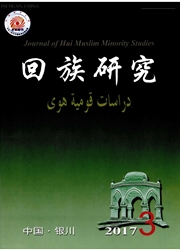

 中文摘要:
中文摘要:
笔者以西宁东关回族社区为考察对象,在深入田野调查的基础上,采用问卷调查法和访谈法对考察对象进行深入剖析后发现,随着现代化和城市化进程,城市回族社区的社会关系和信仰认同发生重大变化,并推动着传统回族社区的社会空间结构开始迅速瓦解和转型;西宁东关回族社区的空间关系逐渐由以原住回族居民内部关系为主的小尺度空间关系转变为来自不同地方回族的更大尺度的空间关系。回汉通婚所导致的宗教信仰代际传承的问题日益凸显,但宗教信仰和饮食习惯对于保持回族历史文化传统具有重要作用;西宁东关回族社区的"认同空间"结构,逐渐由原住回族居民主导的"单一认同空间"转变为由外来回族居民和本地回族居民共同主导的"多元认同空间",而宗教信仰和民族认同在城市回族社区转型过程中的变化具有复杂性。
 英文摘要:
英文摘要:
Dong Guan community in Xining is a representative ethnic Hui community in the north-west regions of China. In addition to field study, this research also employs questionnaire and interview to collect data. After an- alyzing data, it has been found out that, with rapid development of modernization and urbanization, there is a great and notable change in social connections and faith identity in urban ethnic Hui communities. And this development leads to the downfall and transformation to social spatial structure of traditional ethnic Hui community. (2) The changes are happening gradually in the spatial relationships of Dong Guan ethnic Hui community from small scale spatial internal relationships mainly in native residents to the large scale spatial relationships of residents in different places. From the perspective of relational building, the traditional marriage begins to break down under the exten- sive association between ethnic Hui and non-Muslims, and the issues of intergenerational inheritance are increasing- ly prominent by the "Hui-Han marriage". On the other hand, the social relational structure is no longer limited within the ethnic Hui, and the religious belief and dietary habits play important roles in maintaining the ethnic Hui history and cultural traditions. (3)The great changes take place in the construction of identity space gradually from "single identity space" dominated by the original inhabitants to the "multiple identity space" dominated by the mi- grants and original inhabitants together. Religious belief and ethnic identity are very complex in the process of urban transformation of ethnic Hui communities.
 同期刊论文项目
同期刊论文项目
 同项目期刊论文
同项目期刊论文
 期刊信息
期刊信息
